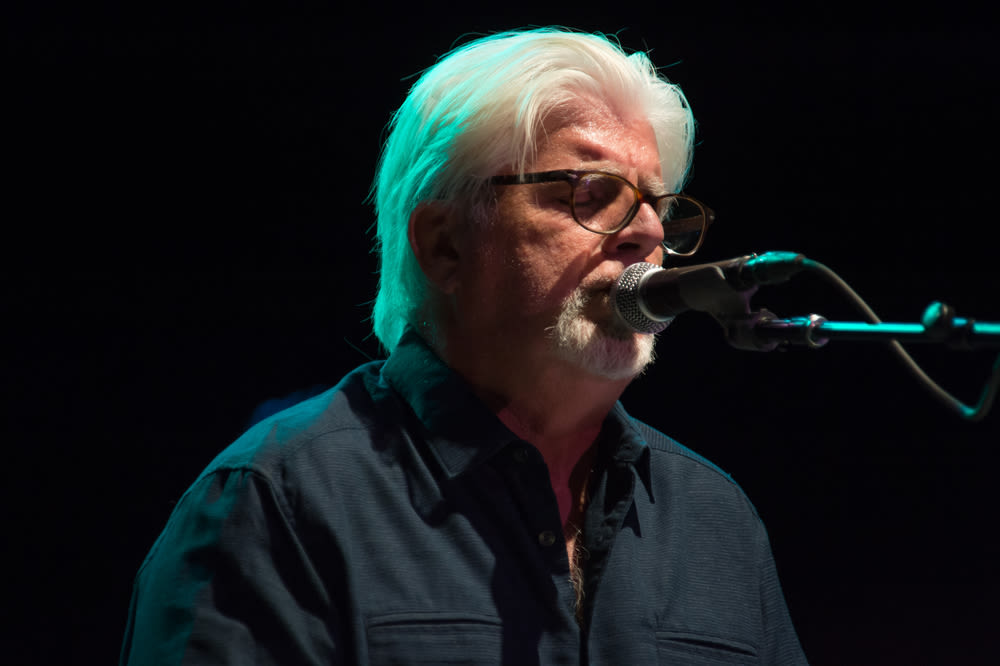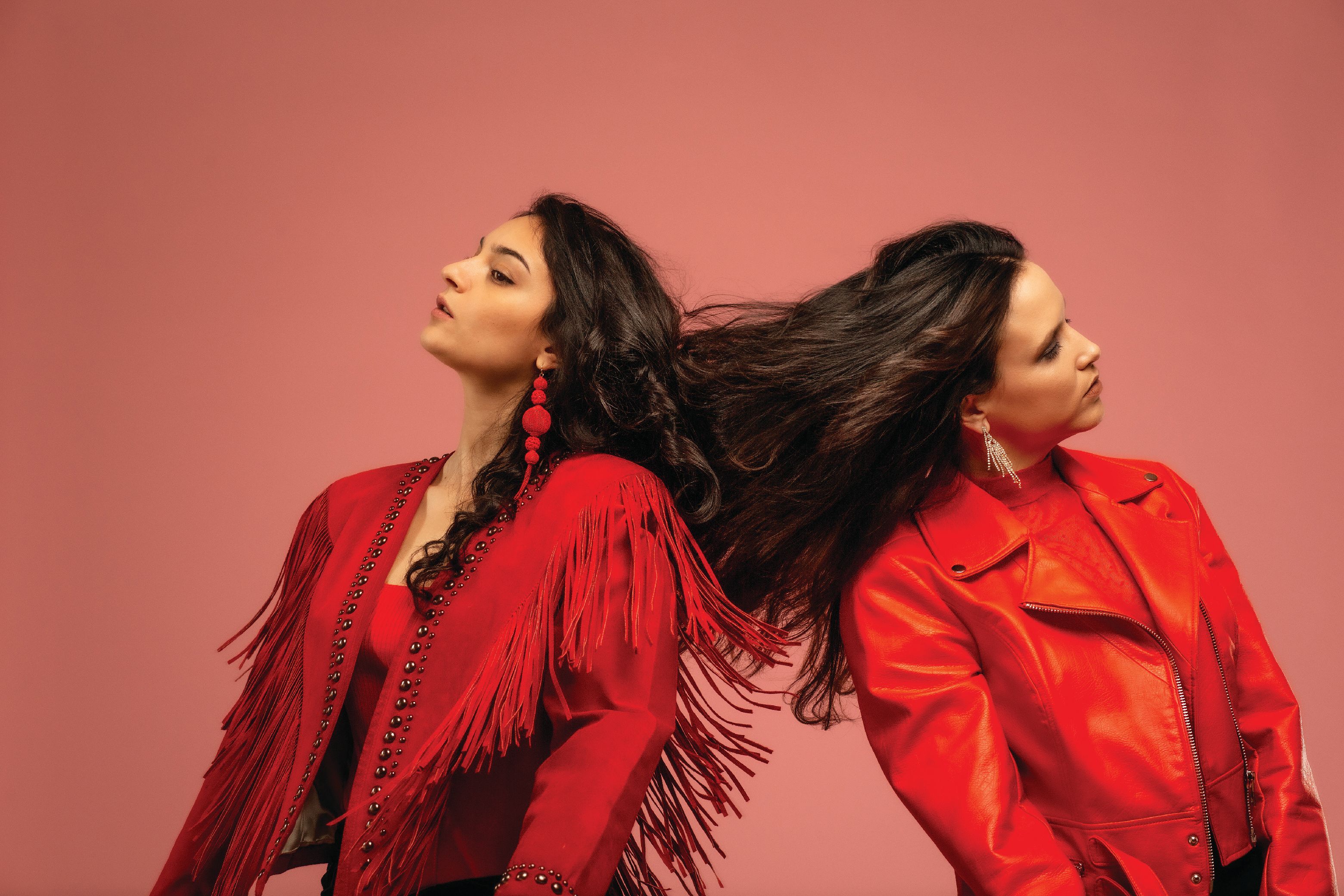- Screening: August 28, 2005
- Audience Share: 68.9%
- Views: 14760

Related Videos
- Hunter Stair .... Kenny Loggins
- JD Ryznar .... Michael McDonald
- Ryan Ridley .... Harold Ramis
- Todd Bishop .... Walter Becker
- Myke Chilian .... Donald Fagen
- Abed Gheith .... Steve Perry
- Wade Randolph .... Jeff "Skunk" Baxter (Skunk Double)
- Megan Geckler .... Kiki "Beaver" Baxter
- Dan Sachoff .... Gene Balboa
- Russell Walters .... Bass Player
- Paul Wirtz .... Well-dressed Sax Man
- Donn Bialik .... Poorly-dressed Sax Man
- Amos Przekaza .... Drummer
- Ryan Elder .... Engineer
- Steve Huey .... "Hollywood" Steve Huey
- Hunter Stair
- David Lyons
- Rod Hassler
- Lane Farnham
- Rick Johnson
- facebook-rs
Sail Away: The Oral History of ‘Yacht Rock’
By Drew Toal
This story was originally published on June 26, 2015
I n the late 1970s and early 1980s, musical artists like Kenny Loggins , Michael McDonald , Steely Dan , Toto , Hall and Oates , and dozens of others regularly popped up on each other’s records, creating a golden era of smooth-music collaboration.
And on June 26th, 2005, an internet phenomenon was born. In 12 short but memorable episodes — first via the the short-film series Channel 101 and then online — JD Ryznar, Hunter Stair, Dave Lyons, Lane Farnham and their friends redefined an era and coined a term for the sultry croonings of McDonald, Fagen, et al.: “yacht rock.”
As “Hollywood” Steve might say, these guys docked a fleet of remarkable hits. This is the story of Yacht Rock, told from stem to stern — a reimagining of a bygone soft-rock renaissance, courtesy of hipsters with fake mustaches, impeccable record collections and a love of smoothness. Long may it sail.
The Michigan Connection JD Ryznar (Director, “Michael McDonald”): I moved from Ann Arbor to L.A., and ended up making friends with all these other guys from Michigan, like “Hollywood” Steve Huey, Hunter Stair, and David Lyons. Pretty much every weekend I’d have “Chinese Thanksgiving” at my apartment — we’d eat BBQ chicken and burgers, drink beer and listen to records of what I called “yacht rock.” You know, like Michael McDonald is singing background vocals and like there’s guys on boats on the covers; it feels like you’re on a yacht listening to it. And the guys were like, oh, we know this music.
Dave Lyons (“Koko”): You know how, in the Seventies, these big bands started playing arena rock? We liked the idea of these smooth bands playing “Marina Rock.” I thought it was a better name.
“Hollywood” Steve Huey (“Hollywood Steve”): What I mostly remember is JD playing Journey records all the time. He was so into Journey that he had photocopied a photo of Steve Perry and pasted it onto his liquid soap dispenser. He wrote “Steve Perry Soap: Clean as all fuck” on it.
Editor’s picks
The 250 greatest guitarists of all time, the 500 greatest albums of all time, the 50 worst decisions in movie history, every awful thing trump has promised to do in a second term.
Lane Farnham (editor, “Jimmy Messina”): JD and I had talked about Journey for a year before we did Yacht Rock. In the third episode, that whole “you need to fly like a pilot” bit? Those are direct lines from Steve Perry in this crazy documentary we found. He’s coked to the gills, in the Eighties, just blabbering about who knows what. We got a kick out of that stuff.
Sail Away: The Oral History of ‘Yacht Rock’ , Page 1 of 12
Dr. Dre Claims He Had Three Strokes Following Brain aneurysm in 2021
- Health Scare
- By Ethan Millman
Chelsea Peretti Gets Choked Up Remembering 'Brooklyn Nine-Nine' Co-Star Andre Braugher: 'It's Hard To Talk About'
- Remembrance
Jimmie Allen's Former Manager Removes Singer From Sexual Assault Lawsuit
- Courts and Crime
Abortion Rights Groups Will No Longer Hand Out Emergency Contraceptives on Olivia Rodrigo's Tour
- 'disappointed'
- By Daniel Kreps
Flo Milli, Cardi B and SZA Remind Us Their Success is Not a Fluke on ‘Never Lose Me’
- By Mankaprr Conteh
Most Popular
Oscars: full list of winners, 'oppenheimer' reigns at oscars with seven wins, including best picture and director: full winners list, kate middleton is reportedly ‘struggling’ with this trait of hers amid her recovery, snoop dogg responds to suge knight's claim that he, diddy, and dr. dre are in "secret society", you might also like, ‘the greatest hits’ review: music makes the heart go round in clunky remix of better rom-coms, exclusive: kourtney kardashian barker talks lemme’s recent target launch ahead of celebratory star-studded brunch, the best yoga mats for any practice, according to instructors, celebrate st. patrick’s day with ‘zardoz,’ the strangest sean connery blockbuster ever filmed in ireland, angel city for sale: nwsl’s most valuable team seeks new owner.
Rolling Stone is a part of Penske Media Corporation. © 2024 Rolling Stone, LLC. All rights reserved.
Verify it's you
Please log in.
Houstonia Magazine
- Eat & Drink
- Arts & Culture
- Style & Shopping
- Travel & Outdoors
- News & City Life
- Home & Real Estate
- Gift Guides
- Health & Wellness
This Is the Definitive Definition of Yacht Rock
By Timothy Malcolm July 12, 2019

Michael McDonald. One might say the smoothest mother in music history.
Image: Randy Miramontez / Shutterstock.com
About 10 years ago , somebody showed me a YouTube video of Michael McDonald and Kenny Loggins writing a song that’s smoother and more polished than anything else on the airwaves.
That video—lovingly spoofing the writing of the Doobie Brothers' 1978 hit “What a Fool Believes”— was the first episode of a series called Yacht Rock . Premiering in 2005 on the Los Angeles-based television incubator Channel 101, Yacht Rock struck a chord with a generation of music nerds who attempt to compartmentalize and categorize the songs they heard as children. The term “yacht rock” itself grew out of the video series, permeating our culture today as much as the music had back in the late 1970s and early '80s.
But here’s the thing about terms that permeate our culture today: They get compromised and bastardized to fit other people’s cozy narratives, typically based on their own nostalgia. Google “yacht rock” and you’ll find articles from across the media spectrum attempting to define the term , failing hard because these writers just don’t get it. There’s even a new BBC series about yacht rock , and while it went into great detail providing context on the emergence of the musical style, it still turned out to be one person’s definition that included songs that were—as some of us might say— nyacht rock.
I’m here to set the record straight—or smooth. Yacht rock is music, primarily created between 1976 and ‘84, that can be characterized as smooth and melodic, and typically combines elements of jazz, rhythm and blues, and rock. You’ll hear very little acoustic guitar (get that “Horse With No Name” out of there) but a lot of Fender Rhodes electric piano. Lyrics don’t get in the way of the song’s usually high musicality (some of the finest Los Angeles session players, including members of the band Toto, play on many yacht rock tunes.) The lyrics may, however, speak about fools. The songs are as light and bubbly as champagne on the high seas, yet oddly complex and intellectual.
And just to hammer this home: Fleetwood Mac is not yacht rock. Daryl Hall & John Oates are 98 percent not yacht rock. Those folkie songs from America, Pure Prairie League, and Crosby, Stills & Nash? Nope. Rupert Holmes's "Escape (The Piña Colada Song)"? Too wordy and not musically interesting—not yacht rock. How about "Summer Breeze" by Seals & Crofts? A little too folky, but close.
I’m not affected by personal nostalgia (I was born in 1984, just as the yacht rock era was ending); instead, I’m an objective music lover who just so happens to have been researching yacht rock for the past several years. I know the men who coined the term “yacht rock” ( they have a great podcast and actually rate whether or not a song is yacht rock ), and they can back me up on this.
So whether you’re docked for the summer or about to set sail on an adventure, allow me to steer you in the right direction. I've crafted for you the definitive yacht rock playlist—below are a few highlights:
“What a Fool Believes,” The Doobie Brothers
I won’t get any nerdier, I’ll just say that this is the song that epitomizes yacht rock. It’s effortlessly melodic, bouncy, and bright, features a prominent Fender Rhodes electric piano, and includes an ultra-smooth vocal from Michael McDonald.
“Heart to Heart,” Kenny Loggins
Loggins never quite knew whether to be a jazzy folkie or a rocker, but in between those two phases were a couple yachty gems, including this cool breeze on a warm summer day, from the 1982 album High Adventure . Just listen to Loggins’s vocal—it’s butter.
“FM,” Steely Dan
Steely Dan brought a New York edge and a habit of wanting the best players on their records to Los Angeles. In time their sound morphed into the whitest smooth jazz on the planet, aka yacht rock. “FM,” from 1978, has both that snarky exterior and smooth center, but look up the band’s classic albums Aja and Gaucho for a number of yachty delights.
“Human Nature,” Michael Jackson
Once you get to know yacht rock, you can begin traveling into yacht soul—smooth songs from top studio players that lean just a little harder on the R&B. This classic song from the 1982 album Thriller was written and performed by Toto. Jackson provides the gorgeously breezy vocal.
“Rosanna,” Toto
Speaking of Toto, these guys were and still are awesome musicians. The 1982 hit “Rosanna” proves this in spades—the drum shuffle is iconic, the twists are remarkable, and the sound is smoother than a well-sanded skiff.
“Nothin’ You Can Do About It,” Airplay
Who is Airplay? A one-album band created by mega-producer David Foster and session guitarist Jay Graydon. These guys wrote Earth, Wind & Fire’s “After the Love Has Gone,” then this absolute stunner from 1980, a bouncy, giddy, and gentle pop classic.
“I Really Don’t Know Anymore,” Christopher Cross
Emerging out of nowhere with a Grammy-winning album in 1979, Cross is the perfect yacht rock figure, a normal-looking white dude who just so happens to sing like the wind on a summer’s evening. This song, from that debut album, is essential yacht rock with a noticeable background singer—of course, Michael McDonald.
If you want to catch McDonald and sing along to some of his yacht rock classics, he’s performing Friday night at Cynthia Woods Mitchell Pavilion in The Woodlands. Chaka Khan—who also has a few yacht rock tunes in her catalog—will open. Tickets start at $39.50; prepare accordingly with this summer yacht rock playlist on Spotify . You’re welcome.
Related Content

On The Town
What to Do and See This Summer
06/01/2021 By Chris Gray

Which Music Venues are Maintaining Covid-19 Restrictions?
03/15/2021 By Sydney Davis

Scary feet, scary feet, scary feet!
5 Things to Do in Houston This Weekend, Oct 23–25
10/23/2020 By Emma Schkloven

On the town
What to Do and See This Month, From Post Malone to Paw Patrol
03/02/2020 By Chris Gray

Defining 'yacht rock' once and for all with the genre's creators
Jd ryznar and dave lyons coined the joke genre while making the mid-2000s comedic web-series of the same name.

Social Sharing

JD Ryznar and Dave Lyons are the co-creators of the mid-2000s comedic web-series Yacht Rock.
While the joke genre they coined led to a legitimate smooth-music renaissance in pop culture, it has also led to a distorted definition of what yacht rock is all about.
The pair join host Elamin Abdelmahmoud to talk about setting the record straight with this week's launch of their podcast Yacht or Nyacht , where they'll adjudicate which songs belong to the yacht rock canon using a scientific scoring system.
WATCH | Yacht Rock Episode 1 :
You can listen to the full discussion from today's show on CBC Listen or on our podcast, Commotion with Elamin Abdelmahmoud, available wherever you get your podcasts .
Interview with JD Ryznar and Dave Lyons produced by Stuart Berman.
Related Stories
- Commotion How Below Deck Down Under started a conversation about rape culture
- Group Chat Is the pop star-making machine broken?
- Commotion Why an English literature professor is teaching a course on Taylor Swift
- Group Chat Like a Prayer turned Madonna into a pop icon. Does it hold up?
- Share full article
For more audio journalism and storytelling, download New York Times Audio , a new iOS app available for news subscribers.
Episode 3: The Birth of American Music
Hosted by Nikole Hannah-Jones, produced by Andy Mills and Annie Brown, and edited by Larissa Anderson and Lisa Chow
For centuries, black music has been an expression of artistic freedom. No wonder everybody is always stealing it.
From The New York Times Magazine, I’m Nikole Hannah-Jones. This is “1619.” This week, Wesley Morris on the birth of American music.
So last fall, I am at my friend’s house. We are making dinner. I’m chopping vegetables. And I asked my friend Brett, who was cooking with me, can you put on some music? And he said, what do you want to listen to? And I said, have you ever heard of yacht rock? And he said, what? I said, yacht rock, have you ever heard of this? And he goes, no, I have not. So he finds the yacht rock station in Pandora, which — I don’t know why or how he’s still a Pandora guy, with all due respect to Pandora. He is one. And he finds the yacht rock station. At some point, Brett has to go run an errand. I think I might have sent him on one, I don’t remember. But he’s gone. So I’m alone, just me, with the vegetables and the yacht rock.
It gives me plenty of time to really think about the songs I’m hearing.
[MUSIC - PLAYER, “BABY COME BACK”] Baby come back, any kind of fool could see —
We’re talking about music made between the years of, I don’t know, I would say, like, 1975 to about 1983. Things like —
[MUSIC - ACES, “HOW LONG”] How long has this been going on?
— Aces, “How Long.”
[MUSIC - SEALS AND CROFTS, “SUMMER BREEZE”] Summer breeze makes me feel fine —
Seals and Crofts, doing “Summer Breeze.”
I’m hearing things like —
[MUSIC - ROBBIE DUPREE, “STEAL AWAY”] Why don’t we steal away —
“Steal Away” by Robbie Dupree.
[MUSIC - ROBBIE DUPREE, “STEAL AWAY”] — steal away, why don’t we —
And The Doobie Brothers, “What a Fool Believes.”
[MUSIC - THE DOOBIE BROTHERS, “WHAT A FOOL BELIEVES”] He came from somewhere back in her long-ago, the sentimental fool don’t see, trying hard to —
It is like our soft rock-est period in American popular music.
The joke of yacht rock is that whoever invented it, and whoever’s making a playlist out of these songs, is basically saying that they’re inconsequential and that what’s in them doesn’t matter.
[MUSIC - SUPERTRAMP, “GOODBYE STRANGER”] Goodbye stranger, it’s been nice —
But what I know I’m hearing is something bigger and deeper than that.
[MUSIC - SUPERTRAMP, “GOODBYE STRANGER”] Tried to see your point of view —
Every song has something about it that is similar to the other songs.
[MUSIC - TOTO, “ROSANNA”] All I want to do when I wake up in the morning is see your eyes —
I’m hearing things like “Rosanna” by Toto.
[MUSIC - TOTO, “ROSANNA”] Rosanna, Rosanna —
Which seems perfectly banal, has a really good beat, sort of builds to its chorus.
[MUSIC - TOTO, “ROSANNA”] All I want to do in the middle of the evening is hold you tight —
But then at the end —
[MUSIC - TOTO, “ROSANNA”] Not quite a year since she went away —
I’m hearing —
[MUSIC - TOTO, “ROSANNA”] Rosanna, yeah —
The great doo-wop harmonies of the ‘50s and ‘60s.
[MUSIC - TOTO, “ROSANNA”] — and I have to say.
There is something jazz-like in the syncopated music of something like Steely Dan.
[MUSIC - STEELY DAN, “DO IT AGAIN”]
You can hear in somebody like Michael McDonald —
[MUSIC - THE DOOBIE BROTHERS, “WHAT A FOOL BELIEVES”]
Ah, ah, ah, ah, ah-ah.
That is, like, a gospel breakdown.
What I’m hearing in all of these songs is, basically, blackness.
[MUSIC - KENNY LOGGINS, “THIS IS IT”]
And the song in which I am hearing it the deepest, and strongest, and most powerfully, at least to me, standing in that kitchen, chopping those vegetables, was when Kenny Loggins’s “This is It” comes on.
[MUSIC - KENNY LOGGINS, “THIS IS IT”] There’ve been times in my life, I’ve been wondering why —
It’s got a kind of loosely disco-like rhythm to it. There’s a lot of percussion sort of going back and forth and around.
[MUSIC - KENNY LOGGINS, “THIS IS IT”] Now I’m not so sure —
“Sure” — Kenny Loggins is basically sing-whispering the verses in this song.
[MUSIC - KENNY LOGGINS, “THIS IS IT”] One good reason to try.
Doing this very light coo —
[MUSIC - KENNY LOGGINS, “THIS IS IT”] But what more can I say?
And then in the pre-chorus, Kenny Loggins disappears, and who shows up? Michael McDonald.
[MUSIC - KENNY LOGGINS, “THIS IS IT”] You think that maybe it’s over, only if you want it to be —
Giving Kenny Loggins plenty of time to gather himself.
[MUSIC - KENNY LOGGINS, “THIS IS IT”] Are you going to wait for a sign — your miracle.
When he sings the word miracle, he doesn’t sing, miracle! He goes, mirr — a — cle!
[MUSIC - KENNY LOGGINS, “THIS IS IT”] Your miracle.
Like he is scraping the bottom of a pan to get all of the good bits off of it before you pour the gravy in.
[MUSIC - KENNY LOGGINS, “THIS IS IT”] Make no mistake where you are. This is it! Your back’s to the corner. This is it.
Scraping the pan is the blackest thing you can do as a singer, and here is Kenny Loggins, as this white artist, doing it.
[MUSIC - KENNY LOGGINS, “THIS IS IT”] The waiting is over, so don’t you run, no —
And then the gravy comes —
[MUSIC - KENNY LOGGINS, “THIS IS IT”] This is it, make no mistake where you are. This is it —
He is at the top of the church at this point. He has elevated himself to the rafters. There’s no more — he is at the roof, trying to clear a way to get to heaven, but there’s just church roof in the way.
[MUSIC - KENNY LOGGINS, “THIS IS IT”] This is it! No one can tell what the future holds. This is it! Your back’s to the corner.
He’s not the greatest singer, but there’s a kind of gumption and nerve to the singing of this song —
[MUSIC - KENNY LOGGINS, “THIS IS IT”] The waiting is over.
— that cannot be denied. A tip of the hat to him. I just had to stand there, and I just — I actually cracked up. I just put down the knife, and I cracked up. And it felt so pleasurable. And then I started thinking about all these other singers I love.
[MUSIC - AMY WINEHOUSE, “BACK TO BLACK”] We only said goodbye with words —
I’m thinking about Amy Winehouse.
[MUSIC - AMY WINEHOUSE, “BACK TO BLACK”] I died a hundred times.
I’m thinking about Annie Lennox.
[MUSIC - ANNIE LENNOX, “LITTLE BIRD”] Give me the strength to carry on.
I’m thinking about George Michael.
[MUSIC - GEORGE MICHAEL, “FAITH”] Before this river becomes an ocean, before you throw my heart back on the floor.
I think about Chris Stapleton —
[MUSIC - CHRIS STAPLETON, “TENNESSEE WHISKEY”] — used to spend my nights out in a barroom.
— who practices a kind of muscly blues that gets written off as country because he’s a big white guy in a hat.
[MUSIC - CHRIS STAPLETON, “TENNESSEE WHISKEY”] Liquor was the only love I’d known.
And one of the many phases in which David Bowie really wanted to make R&B and soul music.
[MUSIC - DAVID BOWIE, “YOUNG AMERICANS”] Young American — the young American — I want the young American —
This is the sound not just of black America, but the sound of America. It is deeply American, almost especially when it’s sung by British people like David Bowie and Annie Lennox and Amy Winehouse. And it fills me with pride. Like, I know that there is something irresistible and ultimately inevitable about black music being a part of American popular music. But it also reminds me that there’s a history to this, a very painful history. And in the most perversely ironic way, it’s this historical pain that is responsible for this music.
[MUSIC - “OLD SHIP OF ZION”]
Some of the oldest recordings we have of black American music are from the 1930s.
And they’re songs that would have been sung by Americans born into slavery.
There’s this one called “Old Ship of Zion.”
You can hear in it these four men, their voices are moving in and out of each other.
And it’s beautiful, and it’s also sad.
You can feel that in your bones.
And then there’ll be music that was completely the opposite, like “Old Coon Dog,” for instance.
[MUSIC - “OLD COON DOG”]
You can hear the playfulness in this song.
And you’ve got this banjo, this great African instrument that becomes the bedrock of American music in so many ways. And that thing is dancing.
[MUSIC - BILLY MCCREA, “BLOW, CORNIE, BLOW”] We soon will be to the landing corner.
— you have someone like Billy McCrea.
[MUSIC - BILLY MCCREA, “BLOW, CORNIE, BLOW”] Blow, Cornie, blow —
And oh, my God, you can hear in his singing what we would now call something like the livelong day.
Years and years of hard work and unimaginable sorrow.
[MUSIC - “OLD SHIP OF ZION”] Landed, landed, landed —
You can also hear in all of this music —
[MUSIC - “OLD SHIP OF ZION”] Landed, landed, landed, mighty mother.
— this undeniable sound of hope.
[MUSIC - “OLD SHIP OF ZION”] Get on board, get on board.
All of these melodies and cadences and emotions are things that would have been passed down generation after generation. It’s what you would have heard on a plantation. It’s what you would have heard walking by a plantation. It’s what you would have heard passing a black person doing his job, entertaining himself doing the drudgery of work, the way a guy named Thomas Dartmouth Rice did sometime around the 1830s. As the story goes, T.D. Rice, a white man, this anonymous nobody actor trying to make ends meet, one day he’s touring with a troupe in Cincinnati, or maybe it was Pittsburgh, we don’t really know. But the myth basically goes, T.D. Rice happened upon an old black man cleaning a horse in a stable. The man was doing his job on property owned by a white man named Crow.
[MUSIC - BILLY MCCREA, “BLOW, CORNIE, BLOW”] Blow, Cornie, blow.
He heard the tune this old black man was singing. He saw the way this man moved his body as he was cleaning this horse. Now, we don’t know what tune this old man would’ve been singing.
[MUSIC - BILLY MCCREA, “BLOW, CORNIE, BLOW”]
Whatever Rice hears coming out of this man’s mouth is captivating to him. And what he sees is an opportunity.
Because showbiz in the 1830s looked like this.
[MUSIC - WILLIAM BYRD, “PAVANE & 2 GALLIARDS IN A MINOR”]
Italian operas, British plays, entertainment imported from Europe. All the people performing this stuff would have been white. The audiences would have been white. After all, it’s 1830. Slavery is in full effect.
And when it came to entertainment, there was nothing new, nothing truly American.
And so when T.D. Rice hears this black man singing this song and moving his body in this particular way, ding, a light bulb goes off. And he takes that light bulb and runs all the way to the theater. He figures out a way to melt down some cork. Lets it cool, presumably takes a rag, or maybe even his hand if it’s cool enough. And then he paints his face black. He goes out on stage, but instead of doing his regular act, he’s got this horse groomer’s tune. Except now, he’s given the tune lyrics.
Come listen, all you gals and boys. I’m just from Tuckahoe. I’m going to sing a little song. My name’s Jim Crow. (SINGING) Wheel about and turn about and do just so. Every time I wheel about, I jump Jim Crow.
And the lyrics give the horse groomer a name. And the name is Jim Crow.
So the crowd goes crazy. They go so bananas, the man gets 20 encores.
This is the first time a paying audience is basically electrified by a white man with a black face. This is the night that Jim Crow was allegedly introduced to America, this mascot of American racism. And this is what America really wanted, which was its own original art form that is not an Italian opera, and isn’t some British guy coming over and thespianing all over them. And here is Thomas Dartmouth Rice giving it to them. This is the night that American popular culture was born.
[MUSIC - “OLD UNCLE NED”] There was an old [racial slur]. They called him Uncle Ned. He is dead long ago, long ago.
Oh, boy. I mean, you know how it goes. This sensational thing happens, and then everybody wants to get on the bandwagon and do their own. So you have other minstrel acts who come along and try to do what Thomas Dartmouth Rice is doing — a song and a dance, and a black face on their white skin.
[MUSIC - “OLD UNCLE NED”] Oh, oh, oh, hang up the fiddle and the bow.
And then from these solo acts, you have, basically, bands forming.
[MUSIC - CHRISTY MINSTRELS]
And the bands have all the instruments that you would have in a band that you’d recognize now. There is a banjo and a fiddle and some tambourines, and percussion in the form of bones, which would come from a pig sometimes.
That is the formation of what will become the minstrel troupe.
And the place that minstrelsy took hold was in the North — places like Philadelphia and New York and Boston, where you’d have these theaters dedicated to minstrel acts, where minstrel acts would just move into a theater and do their act night after night after night after night after night. And a lot of these performers had never been meaningfully south to have a meaningful relationship with black people. And so they just made stuff up, based on what they thought black people were like.
(SINGING) I want you to know that Im ragged but right, hobo-like and living like you people ask why.
They were able to draw on things that were coming to America from other parts of Europe, like the polka.
[MUSIC - EDISON MINSTRELS, “MINSTREL POTPOURRI”] Come all you colored people now and gather ‘round me close, and listen to what I’m gonna sing.
And so you had, over the course of the formation of this culture, an inherent mixing. You had some amazing mix of —
[MUSIC - DAN EMMETT, “DE BOATMAN’S DANCE”]
— an imagined blackness, real, actual Irish melodies, and Polish music, with what we would now call gospel, but spiritual harmonies, interlaced together with this African banjo —
— basically welding into a fusion that becomes the thing that everybody wants to try to do.
[MUSIC - DAN EMMETT, “OLD DAN TUCKER”]
The whole thing just sweeps the nation. And for the rest of the 19th century, this is the shit. Can we say that?
Oh, very much so.
I think so!
And so, for the rest of the 19th century, this is the shit.
This is America’s primary form of entertainment. People are going crazy for blackface minstrels. You have little boys going to bed and dreaming about how they can become part of this minstrel show. Some of those people having these dreams go on to become people like Stephen Foster.
[MUSIC - VICTOR LIGHT OPERA COMPANY, “OH! SUSANNA”] I came from Alabama with my banjo on my knee, I’m going to Louisiana, my true love for to see.
Stephen Foster, the man widely credited as being the father of American music.
[MUSIC - VICTOR LIGHT OPERA COMPANY, “OH! SUSANNA”] Oh, Susanna! Oh, don’t you cry for me.
Some of his songs, some of his most famous songs, songs you know, songs you love, songs you still sing, songs your children, if you have them, they still sing, some of those songs were written for blackface performers.
[MUSIC - CHRISTY MINSTRELS, “CAMPTOWN RACES”] The camptown ladies sing this song, doo-dah, doo-dah.
And if you listen to something like “Camptown Races,” you can hear in it all of its minstrel properties.
[MUSIC - CHRISTY MINSTRELS, “CAMPTOWN RACES”] I go back home with a pocketful of tin, oh doo-dah day.
The song, of course, is written in so-called “Negro” dialect. I mean, instead of saying “going,” you’re saying “gwine.”
[MUSIC - CHRISTY MINSTRELS, “CAMPTOWN RACES”] Gwine to run all night, gwine to run all day.
Like, instead of saying, O-F for of, you get a lot of D-E for de.
[MUSIC - CHRISTY MINSTRELS, “CAMPTOWN RACES”] The blind horse sticking in a big mud hole — doo-dah, doo-dah.
This is a white person imagining how a black person would sing this song. And that was a gold rush-era hit.
[MUSIC - STEPHEN FOSTER, “CAMPTOWN RACES] Gwine to run all night, gwine to run all day. I’ll bet my money on the bobtail nag.
This is the “I Want to Hold Your Hand” of 1851.
[MUSIC - STEPHEN FOSTER, “CAMPTOWN RACES”] Somebody bet on the bay.
Part of the problem that we still live with now is that it was so much the heart and soul of American culture that it wasn’t that it became not racist, it just was a thing that you did. If you wanted to be an entertainer at any point after 1830, you, in all likelihood, were at least going to try to be a blackface minstrel, even if you were black.
[MUSIC - BROTHER BONES]
After the Civil War ends, and there’s an opportunity for black people to perform, they have to do what the nation wants. And what the nation wants at that point is blackface.
And now, giving you noise in tempo, F.E. Miller and Scatman Crothers.
So black people blacked up and performed as black people who weren’t actually black.
You the laziest man I ever did see. What’s wrong with you, now? What’s wrong with you?
I’m tired, tired.
By the time you have black people painting their faces black to perform as black people, the only question you can really ask at this point is, what the hell is going on? Why is this happening? What was so captivating about seeing black people represented this way? Why would a white audience have clamored for it so much? I think one of the things that it offered was an opportunity to feel good about a thing that actually felt really bad at the time. People were really torn about whether to continue with slavery or whether to abolish it. The minstrel show didn’t really give you an answer, but it provided a platform by which you could either escape from actually having to think about that question that really was tearing the nation apart, or depending on which show you would wind up seeing, it fully engaged you in the lightest possible way about enslaved people and how you didn’t really have to feel so bad for them, because they like being enslaved. You got to laugh at a thing that you actually felt so anguished about. You get to watch these black people, who are really a source of national agony outside the theater, become fools inside the theater. And in sitting in that theater, watching these white men in blackface make fools of black people, a white audience could feel cultured. They could feel civilized. They could feel superior to the people they were watching be made fun of. And in a crazy way, watching them dehumanize would really have been an opportunity for a white audience to feel so much better about their own humanity.
By the time you get to the 20th century, minstrelsy is still with us. It is the basis upon which American movies are built. This country’s first movie blockbuster, D.W. Griffith’s “The Birth of a Nation,” full of white men villainously in blackface.
I am privileged to say a few words to you —
And America’s first talking motion picture —
— in this most modern and novel manner.
— “The Jazz Singer,” about a Jewish man who feels most himself not as a Jewish man struggling with his Jewish identity and pleasing his cantor father, no, no —
Mammy, I’m coming. Oh, God, I hope I’m not late.
It’s when he blacks his face up and performs “Mammy” as a Negro.
[MUSIC - AL JOLSON, “MAMMY”] I’d walk a million miles, for one of your smiles, my Mammy.
Some of America’s favorite stars did numbers in blackface.
[MUSIC - JUDY GARLAND, “SWING LOW, SWEET CHARIOT”] Oh, I come from South, from the deep, deep South.
Judy Garland performed in blackface.
[MUSIC - JUDY GARLAND, “SWING LOW, SWEET CHARIOT”] And my pappy reads Esquire with delight, while my Alabama mammy plays bridge all night, way down South in Dixie. Swing low —
Bing Crosby and Fred Astaire both performed in blackface.
(SINGING) I’d rather see a minstrel show than any other show I know.
“White Christmas” has a whole number. The most famous number in “White Christmas” involves a blackface tune.
(SINGING) — I’d pawn my overcoat and vest to see a minstrel show.
But at the same time, there’s the beginnings of a recording industry. And you had black artists who had access to recording studios.
Out of these recordings, you have people like Muddy Waters —
[MUSIC - MUDDY WATERS, “YOU’RE GONNA MISS ME”] Well, now, let me tell you people a low-down thing or two, I just can’t stand that old evil way she do. She’s gonna miss me.
— inventing and perfecting blues rhythm, blues ideas, blues expression, the expression of —
[MUSIC - MUDDY WATERS, “YOU’RE GONNA MISS ME”] Oh, you gonna miss me, child, when I’m dead and gone.
— of a fully human black self in American popular art.
[MUSIC - MUDDY WATERS, “YOU’RE GONNA MISS ME”] She wouldn’t let me in. Told me, go away, Muddy, I’ve got too many friends. She’s gonna miss me.
He had a kind of confidence that most people would never have heard coming from a black person before.
[MUSIC - MUDDY WATERS, “YOU’RE GONNA MISS ME”] All right, son.
And this is just the beginning.
[MUSIC - SIDNEY BECHET, “ALL OF ME”]
You have the advent of a place like Blue Note Records, where lots of amazing jazz was created and then released into the world.
People like Sidney Bechet.
[MUSIC - LOUIS ARMSTRONG, “LA VIE EN ROSE”]
And then Louis Armstrong.
And Duke Ellington.
[MUSIC - DUKE ELLINGTON, “JACK THE BEAR”]
You have black musicians thinking about how to move not only music forward, but American culture forward.
Thinking about how these instruments can do other things besides make what we think of as Western European classical music.
[MUSIC - CHARLES MINGUS, “BETTER GIT IT IN YOUR SOUL”]
And taking music to a place that nobody had ever tried to previously take it.
[MUSIC - JOHN COLTRANE, “BLUE TRAIN”]
People who just kept pushing it forward and beyond.
[MUSIC - MILES DAVIS AND CHARLIE PARKER, “A NIGHT IN TUNISIA”]
Then you have the development of the single most important movement black people have ever had artistically. And that is the advent of Motown Records.
[MUSIC - MARTHA REEVES AND THE VANDELLAS, “NOWHERE TO RUN”] Nowhere to run to, baby, nowhere to hide.
Motown is the most powerful mass-produced expression of black glamour, of black self-confidence, of black self-reliance.
[MUSIC - BARRETT STRONG, “MONEY (THAT’S WHAT I WANT)”] The best things in life are free, but you can give them to the birds and bees. I need money —
Its project was to get black producers, black musicians, black singers to take, quote, “white,” quote, “Western” musical ideas of orchestration, strings and horns —
[MUSIC - THE DRIFTERS, “THIS MAGIC MOMENT”] This magic moment —
— and straightforward harmonies —
[MUSIC - THE DRIFTERS, “THIS MAGIC MOMENT”] — so different and so new —
— and you marry them to a black weekend.
[MUSIC - THE CONTOURS, “DO YOU LOVE ME”] Do you love me? I can really move —
Where on Saturday night, you’re at a juke joint, having a good time with rhythm and blues music, guitar and drum and bass.
[MUSIC - THE CONTOURS, “DO YOU LOVE ME”] Now that I can dance — dance —
Sex, basically.
[MUSIC - THE CONTOURS, “DO YOU LOVE ME”] Watch me now — work, work — oh, work it out, baby — work, work —
And then you go home, slightly hung over.
And you wake up, and you go to church on Sunday morning.
[MUSIC - MARVIN GAYE AND TAMMI TERRELL, “AIN’T NO MOUNTAIN HIGH ENOUGH”] Listen, baby, ain’t no mountain high, ain’t no valley low, ain’t no river wide enough, baby —
Where there’s a whole other musical experience involving hand claps, and different harmonic arrangements, and call and response.
[MUSIC - MARVIN GAYE AND TAMMI TERRELL, “AIN’T NO MOUNTAIN HIGH ENOUGH”] No matter how far. Don’t worry, baby. Just call my name —
A lot of feeling, a lot of oomph, a lot of gratitude.
[MUSIC - FOUR TOPS, “BABY I NEED YOUR LOVING”] Baby, I need your loving, got to have all your loving —
You have the combination of these three different areas of musical expression happening at the same time in just about every single Motown record.
[MUSIC - FOUR TOPS, “REACH OUT I’LL BE THERE”] Darling, reach out — come on, girl —
Whether it’s the Four Tops doing “Reach Out I’ll be There.”
[MUSIC - FOUR TOPS, “REACH OUT I’LL BE THERE”] I’ll be there —
Or Martha and the Vandellas doing “Heat Wave.”
[MUSIC - MARTHA AND THE VANDELLAS, ”(LOVE IS LIKE A) HEAT WAVE”] Yeah, yeah, yeah, yeah, girl, oh —
On something like “Heat Wave,” you can hear hands slapping the tambourine like it actually is Sunday morning.
[MUSIC - MARTHA AND THE VANDELLAS, ”(LOVE IS LIKE A) HEAT WAVE”] I feeling it burning right here in my heart —
Then when everything is firing —
[MUSIC - FOUR TOPS, “I CAN’T HELP MYSELF (SUGAR PIE, HONEY BUNCH)”] Girl, it starts the flame, burning in my heart, tearing it all apart. No matter how I try, my love I cannot hide. Oh, sugar pie, honey bunch — sugar pie, honey bunch —
It’s just the most exciting, romantic sound you’re ever going to hear. And at the center of it is what can only be described as a refulgent, tasteful blackness.
Here you have in Motown a force that is actively combating these ideas of black people as being inherently inferior.
Motown is the antidote to American minstrelsy.
[MUSIC - THE SUPREMES, “BABY LOVE”] Ooh, baby love, my baby love, I need you, oh, how I need you.
[MUSIC - THE JACKSON 5, “I WANT YOU BACK”] Oh, just let me tell you now —
[MUSIC - SMOKEY ROBINSON AND THE MIRACLES, “YOU’VE REALLY GOT A HOLD ON ME”] Really got a hold on me. Really got a hold —
[MUSIC - MARVIN GAYE, “I HEARD IT THROUGH THE GRAPEVINE”] A man ain’t supposed to cry, but these tears I can’t hold inside. Losing you would end my life you see —
[MUSIC - PLAYER, “BABY, COME BACK”] Baby, come back, oh, baby, any kind of fool could see there was something in everything about you.
And this is what I was thinking about standing there in that kitchen, chopping those vegetables. It’s — the thing that made me laugh was just how all that history is just very silently coursing through this music. It might not even be aware that it’s even there. It’s so thoroughly atomized into American culture. It’s going to show up in a way that even people making the art can’t quite put their finger on. What you’re hearing in black music that’s so appealing to so many people of all races across time is possibility, struggle. It is strife. It is humor. It is sex. It is confidence. And that’s ironic. Because this is the sound of a people who, for decades and centuries, have been denied freedom. And yet what you respond to in black music is the ultimate expression of a belief in that freedom, the belief that the struggle is worth it, that the pain begets joy, and that that joy you’re experiencing is not only contagious, it’s necessary and urgent and irresistible. Black music is American music. Because as Americans, we say we believe in freedom. And that’s what we tell the world. And the power of black music is that it’s the ultimate expression of that belief in American freedom.

- October 12, 2019 • 36:40 Episode 5: The Land of Our Fathers, Part 2
- October 5, 2019 • 29:18 Episode 5: The Land of Our Fathers, Part 1
- September 14, 2019 • 39:13 Episode 4: How the Bad Blood Started
- September 6, 2019 • 34:34 Episode 3: The Birth of American Music
- August 31, 2019 • 31:55 Episode 2: The Economy That Slavery Built
- August 23, 2019 • 42:56 Episode 1: The Fight for a True Democracy
- August 22, 2019 • 4:42 Trailer: Introducing ‘1619’
Listen and subscribe to our podcast from your mobile device: Via Apple Podcasts | Via Google Podcasts | Via Stitcher
Black music, forged in captivity, became the sound of complete artistic freedom. It also became the sound of America.
On today’s episode:
Wesley Morris , a critic-at-large for The New York Times.
Nikole Hannah-Jones , who writes for The Times Magazine.

Background reading:
“The proliferation of black music across the planet — the proliferation, in so many senses, of being black — constitutes a magnificent joke on American racism,” Wesley Morris writes .
The “1619” audio series is part of The 1619 Project, a major initiative from The Times observing the 400th anniversary of the beginning of American slavery. Read more from the project here .
Tune in, and tell us what you think. Email us at [email protected] . Follow Nikole Hannah-Jones on Twitter: @nhannahjones .
Advertisement
- Skip to main content
- Keyboard shortcuts for audio player
- World Cafe Playlist
- Sense Of Place
- Latin Roots
- Heavy Rotation
- New Orleans
That '70s Week: Yacht Rock

Talia Schlanger

Donald Fagen (left) and Walter Becker of Steely Dan. Danny Clinch/Courtesy of the artist hide caption
Donald Fagen (left) and Walter Becker of Steely Dan.
- The Doobie Brothers, "What A Fool Believes"
- Christopher Cross, "Sailing"
- Sade, "Smooth Operator"
- Nielsen/Pearson, "If You Should Sail"
- Ned Doheny, "Get It Up For Love"
- Iron & Wine, "Desert Babbler"
- Young Gun Silver Fox, "You Can Feel It"
What's the best way to become the unchallenged expert on a particular genre of music? Invent it. Enter JD Ryznar, Hunter Stair, David B. Lyons and Steve Huey: coiners of the description "yacht rock," creators of a hilarious web series of the same name and now de facto captains of the genre. Broadly speaking, yacht rock is an ocean of smooth, soft-listening music made in the late '70s and early '80s by artists like Toto, Hall & Oates and Kenny Loggins — music you can sail to. But as David and Talia learn in this conversation with the arbiters of Yacht Rock , the waters are much murkier than that.
For example, according to Ryznar, "There's also a common misconception that just because it's about a boat, or the ocean, or sailing, that it's yacht rock. That is most definitely nyacht true." Thankfully, on their Beyond Yacht Rock podcast, our guests have developed a sound system of logical criteria to define what is "Yacht" and what is "Nyacht." They employ their patented "Yachtzee scale" to examine a song's "Yachtness" based on a number of factors, including its personnel (is there a Doobie Brother in there?), amount of jazz and R&B influence, geographic origin (Southern California is a plus) and lyrical obtuseness.
Listen as Ryznar and Lyons steer us towards the musical marina with a buoyant "Yacht or Nyacht" debate that includes Michael McDonald, Christopher Cross, Sade and the most serious discussion you can have about the proper soundtrack for standing shirtless on a deck wearing boat shoes and a sailor cap. Dive on in --the water's great.
Listen: JD Ryznar's Yacht Rock Primer
Episode playlist.
- Michael McDonald
- Hall & Oates

- Shows & Movies
- 64% 11 votes
- Rate this show What did you think?
- 68 watchers
- 87 collected
- 3 favorited


Yacht Rock 2005 NR
- Recent Episodes
- All cast & crew Actors
- All episodes 1 Season
- All comments 0 Comments
- All lists 76 Lists
- Official Site IMDB TMDB TVDB Fanart.tv JustWatch Wikipedia
- Refresh Data Datasource: tmdb
- TMDB Comparison Already uses TMDB
- Set Profile Image

- Status Ended
- Premiered 2005-06-26T00:00:00Z
- Runtime 5 m
- Total Runtime 1 h (12 episodes)
- Creators J.D. Ryznar + 2 more , Hunter Stair , Lane Farnham
- Languages English
- Studio Channel 101
- Genres Comedy

Actors All Cast & Crew
Guest stars 98, j.d. ryznar, michael mcdonald, 12 episodes, hunter stair, kenny loggins, "hollywood" steve huey, david b. lyons, koko goldstein, russell walters, doobie guitarist, amos przekaza, doobie drummer, dan sachoff, gene balboa, wade randolph, justin roiland, christopher cross, lane farnham, jim messina, jeremy hurlburt, jeff "skunk" baxter, drew hancock, tom savarese, koko's arm candy #2, todd bishop, walter becker, myke chilian, donald fagen, abed gheith, steve perry, steve porcaro, erni walker, kelly kubik, alex van halen, ted templeman, megan geckler, koko's arm candy #1, jessie matekunas, anthony stitt, doobie bassist, ryan ridley, harold ramis, donn bialik, poorly-dressed sax man, christian le guilloux, david hungate, demorge brown, michael jackson, latoya jackson, tyler spiers, eddie van halen, dusty tazelaar, lord charles "turnip" townsend, leah castillo ryznar, background singer #2, michelle basterrechea, parrothead dancer, kyle reiter, blood-drooling parrothead, wyatt cenac, james ingram, kevin bacon, james adomian, vincent price, "cleveland" drew carey, john konesky, giorgio moroder, detroit mutant radio, the doobie brothers, demetriss moore, lita o'donnell, doug benson, peter cetera, well-dressed sax man, morgan murphy, rosanna arquette, craig vegas, steve lukather, nigel filson, "big rapids" gary huey, goodman oates, goodman hall, nick butner, jack-in-the-green, james menning, "hollywood" steve's lover, matt orduna, mehran heard, scott chernoff, daryl dragon, andy goldblatt, toni tennille, daniel murrell, courtney hopkins, sara kaye larson, skip carpenter, david lee roth, duane burda, raul b. fernandez, john kyle grady, ford austin, elizabeth elder, background singer #1, vatche panos, jimmy buffett, jessica manuel, louise moore, buffett guitarist, aaron moles, severed-arm parrothead, dean pelton, horrified parrothead, timothy marklevitz, lindsey buckingham, ray charles, eric acosta, jason makiaris, kelsy abbott, cyndi lauper, willie nelson, james atkinson, lionel richie, willy roberts, smokey robinson, eric falconer, kenny rogers, nydia jenkins, john spiker, matt braunger, bruce springsteen, daheli hall, tina turner, johnny walker, stevie wonder, andre gregg, quincy jones, steve ellis, gene balboa's dog, sevan najarian, boom operator, lindsey willis, dr. beachwood, kate freund, emily hurlburt, dan murrell, 1 season number number popularity percentage votes watchers plays collected lists show all fade watched partially watched not watched collected partially collected not collected listed not listed rated not rated hide watched partially watched not watched collected partially collected not collected listed not listed rated not rated.

If you like Yacht Rock , check out...
Find a tv show or movie.
- Action/Adventure
- Children's/Family
- Documentary/Reality
- Amazon Prime Video

Latest on Yacht Rock

Stream It Or Skip It: 'Sometimes When We Touch' on Paramount+, A Doc That Observes The Rise And Legacy Of The '70s Soft Rock Sound
Trending now.
This story has been shared 6,502 times. 6,502
This story has been shared 4,342 times. 4,342
This story has been shared 4,152 times. 4,152
This story has been shared 3,213 times. 3,213
This story has been shared 2,805 times. 2,805
This story has been shared 2,570 times. 2,570
This story has been shared 2,553 times. 2,553
This story has been shared 2,383 times. 2,383
Stream It Or Skip It?
Stream it or skip it: ‘trolls band together’ on peacock, a threequel stuffed with visual tomfoolery and cutesy karaoke, stream it or skip it: ‘what happens later’ on paramount+, meg ryan's winkingly self-aware return to rom-coms, stream it or skip it: 'iron reign' on netflix, where a drug shipment gone wrong sparks a gang war in barcelona, stream it or skip it: 'chicken nugget' on netflix, a koren comedy where a woman gets transformed into a chicken nugget (really), stream it or skip it: ‘art of love’ on netflix, a turkish art-heist romantic thriller, more from decider.

Whoopi Goldberg Tells 'The View' She Thinks Donald Trump Has Been Using AI In His Appearances: "I Don't Believe Trump Is Actually Out There"

John Oliver Tells Andy Cohen That He Thinks Kate Middleton Is "Dead" Until Proven Otherwise On 'WWHL'

Lindsay Lohan Tells Drew Barrymore That She Walked In On Her Son Watching 'The Parent Trap': "I Started Crying"

Robert De Niro Tells Bill Maher That Donald Trump 2024 Win Would Be A 'Nightmare'

John Cena Tells Drew Barrymore He's Still "Waiting" For His Invite To WrestleMania 40: "I Haven't Been Asked To Go Yet"

Jenna Bush Hager Admits On 'Today' She Used To Show George W. Bush 'SNL' Skits Mocking Him: "He Thought It Was Hilarious"
- Show Spoilers
- Night Vision
- Sticky Header
- Highlight Links

Follow TV Tropes
http://tvtropes.org/pmwiki/pmwiki.php/WebVideo/YachtRock
Web Video / Yacht Rock
Edit locked.
Yacht Rock is an 12-part series following the fictionalized lives and careers of American Soft Rock stars of the late 1970s and early 1980s. Created by JD Ryznar, Hunter D Stair and Lane Farnham, it is one of the most successful projects to come out of Channel101 .
J. D. Ryznar and Hunter D. Stair devised the series after noticing the incestuous recording careers of such bands as Steely Dan , Toto , and The Doobie Brothers and the singer-songwriters Kenny Loggins and Michael McDonald . For example, McDonald co-wrote Loggins' "This Is It" and Loggins co-wrote McDonald's band The Doobie Brothers ' "What a Fool Believes" and also performed backing vocals for several other 'yacht rock' artists, including Steely Dan and Christopher Cross. Yacht Rock's episodes were "hosted" by "Hollywood" Steve Huey , a legitimate music critic for Allmusic. It should be noted that the term "Yacht Rock" is never used throughout the series by any characters except for by Huey during his introductions, instead it is always referred to as "Smooth Music". The look of the series was the responsibility of the show's editor Lane Farnham.
The storyline of the series employs a non-linear chronology, jumping back and forth in various points in time. Also, Space.
After the series became a web hit, the term yacht rock was retroactively popularized as the genre name for the style of soft rock featured in the show, marked by high production values, Jazz Fusion and R&B influences, and lyrics about romantic longing and personal follies, acting as an American equivalent to the Sophisti-Pop and City Pop scenes in the UK and Japan, respectively. Ryznar and Stair further specified their definition of the term as encompassing usage of upbeat rhythms, prominent usage of electric piano, and a reliance on elite producers and musicians from Los Angeles . Owed to their discontent with what they saw as the label's dilution, the pair went on to host two podcasts — Beyond Yacht Rock and Yacht or Nyacht? — in which they debate whether individual songs count as being part of their definition of the genre.
Trope examples:
- Arc Villain : Jimmy Buffett, who functioned as an insane cult leader in his lone episode.
- Affectionate Parody : While the show makes fun of the songwriting process, it does still hold the music featured in high regard.
- Batman Gambit : Most of episodes show the "origins" of several yacht rock classics by way of this trope, from " Rosanna " to " Human Nature "
- Big Bad : Gene Balboa runs his entertainment business like a Bond villain.
- Beethoven Was an Alien Spy : Several (real life) characters are revealed to be aliens.
- The Bet : Cartoonishly downplayed in episode 7 where Loggins and McDonald bet a dollar on which one of their songs will end up number 2 on the music charts. McDonald gets the last laugh, though .
- Brainwashed and Crazy
- Carpet of Virility : John Oates, albeit made out of construction paper .
- Canon Character All Along : Hall and Oates' first manager, Gino Basareli turns out to be Gene Balboa after a drastic makeover .
- Cerebus Syndrome : Played for Laughs in the Hollywood Steve host segments for the last two episodes. While Episode 10 ends with him falling in love with the girl he saves from choking, Episode 11 opens with said girl leaving him and Episode 12 with Steve on his death bed.
- In episode 2, when Koko hears Chris Geppert plays his song.
- Happens twice to Ted Templeman, first in episode 8 involving smooth music from a singing walrus being interrupted by two ugly women and in episode 9 with visions of impalement .
- Downer Ending : Episode 2 and 12
- Easy Amnesia : McDonald after he gets run over by Warren G.
- Insistent Terminology : Only Hollywood Steve refers to it as "Yacht Rock" in his introductions. Everyone else calls it "Smooth Music"
- Jerkass : John Oates is depicted as an abusive foulmouthed control freak.
- Jerk Jock : Don Henley and Glenn Frey of the Eagles are depicted as this.
- Halloween Episode : Episode 5, complete with a Vincent Price led exorcism.
- The doo-wop section of Van Halen 's song "I'm the One" is the result of an in-studio scuffle between Koko Goldstein and Ted Templeman.
- " Human Nature " got recorded thanks to Koko's spirit harpooning Michael Jackson 's crotch .
- "I Keep Forgettin' (Every Time You're Near)" got sampled in "Regulate" because Nate Dogg and Warren G ran over McDonald.
- Glenn Frey and Don Henley sang background vocals for Steely Dan's song "FM" because they beat the crap out of them after as revenge.
- The title of "Yah Mo B There" came from a drunk Michael McDonald and James Ingram making fun of Kenny Loggins saying over the phone that he would be by to record some music with them later (with a mouthful of apple so it came out as "Yah Mo Be There")...they kept it up the whole time.
- Hostile Show Takeover : Happens twice in the series, with Hollywood Steve's dad in episode 6 and Drew Carey in episode 9.
- Human Aliens : Giorgio Moroder , who hails from Planet Synthos.
- Impaled with Extreme Prejudice : In episode two, Koko dies by being impaled with his lucky harpoon .
- Manchurian Agent : David Lee Roth and Eddie Van Halen use a magical amulet on Ted Templeman so that he'll produce their debut album when he hears Micheal McDonald's voice.
- Nobody Loves the Bassist : Provides the page quote.
- Origins Episode : Episode 8 shows how yacht rock got started, from McDonald leaving Steely Dan for The Doobie Brothers to Loggins and Messina in happier days.
- Post-Script Season : Downplayed as there were two more episodes made after the "finale" with episode 10.
- The Power of Rock : All over the place, especially the crotch laser Loggins shoots to defeat the Parrotheads .
- Record Producer : Koko Goldstein , Gene Balboa and Ted Templeman .
- The Reveal : Papa Moroder is Koko, and his body was only a vessel.
- Hollywood Steve introducing the episodes in inconvenient moments, like using the bathroom, attending a funeral, killing a homeless woman .
- Descriptors for Loggins and McDonald.
- Gene Balboa makes increasingly bizarre demands to his unseen manservant Manuel.
- Shout-Out : The final battle in episode 12 resembles the Death Star approach from Star Wars . It even has a Big Damn Heroes moment by the Millennium Falcon!
- Special Guest : Episode 11, Jason Lee as Kevin Bacon and Wyatt Cenac as James Ingram.
- Story Arc : Throughout the series, Loggins tries to move away from the smoothness of yacht rock to straight hard rockin' to make his way up to the top. This is shown to be like him sliding to "the dark side", but Rule of Funny of course.
- Storybook Episode : Episode 6 uses the plot of episode 1 to tell a fairytale version of both the historical and modern Jethro Tull .
- Take That! : Most of the parody is affectionate, but the invectives against Jimmy Buffett are particularly strong. James Ingram: "Yah mo murdered a lot of people out here tonight." Michael McDonald: "They're not people, James Ingram. They're Jimmy Buffett fans." Jimmy Buffett: "...with a cheeseburger in paradise..." Gene Balboa: "Fuck you, Jimmy Buffett!" Kevin Bacon : "Your music is shit!"
- The Unintelligible : Donald Fagen , with some exceptions. Donald Fagen: " Eat. Bat. Prick. "
- The Un-Reveal : Koko Goldstein's killer, as Hollywood Steve died while narrating it.
- Vitriolic Best Buds : Michael McDonald and Kenny Loggins
- We Used to Be Friends : Loggins and Messina, especially when Loggins starts going solo and Messina ends up being a drunk.
- Wormtooth Nation
- Web Video Series
- YidLife Crisis
- Youth Is Wasted on the Dumb
- QuoteSource/Internet
- Nobody Loves the Bassist
Important Links
- Action Adventure
- Commercials
- Crime & Punishment
- Professional Wrestling
- Speculative Fiction
- Sports Story
- Animation (Western)
- Music And Sound Effects
- Print Media
- Sequential Art
- Tabletop Games
- Applied Phlebotinum
- Characterization
- Characters As Device
- Narrative Devices
- British Telly
- The Contributors
- Creator Speak
- Derivative Works
- Laws And Formulas
- Show Business
- Split Personality
- Truth And Lies
- Truth In Television
- Fate And Prophecy
- Edit Reasons
- Isolated Pages
- Images List
- Recent Videos
- Crowner Activity
- Un-typed Pages
- Recent Page Type Changes
- Trope Entry
- Character Sheet
- Playing With
- Creating New Redirects
- Cross Wicking
- Tips for Editing
- Text Formatting Rules
- Handling Spoilers
- Administrivia
- Trope Repair Shop
- Image Pickin'
Advertisement:
- Cast & crew
- User reviews

Episode list

S1.E6 ∙ Big Rapids: Gary's Tales of Significant History
S1.e7 ∙ i keep forgettin', s1.e8 ∙ gino the manager, s1.e9 ∙ runnin' with the devil, s1.e10 ∙ fm, contribute to this page.

- See more gaps
- Learn more about contributing
More from this title
More to explore.

Recently viewed

Yacht Rock Episodes

Baby Come Back (w Peter Beckett of Player) - Episode 819

Crazy Love (w Rusty Young of Poco) - Episode 703

"How Long" (Ace) w/Paul Carrack Interview - Episode 618

Hooked on a Feeling (w/BJ Thomas) - Episode 611

Biggest Part of Me (Ambrosia) w/Burleigh Drummond Interview - Episode 608

Escape (The Piña Colada Song) + Rupert Holmes Interview - Episode 606

You Can Call Me Al (Paul Simon) - Episode 319

You Make My Dreams (Hall and Oates) - Episode 303

Life's Been Good (Joe Walsh) - Episode 220

Reelin' in the Years (Steely Dan) - Episode 218

Dance With Me (Orleans) - Episode 210

Arthur's Theme (Best That You Can Do) - Christopher Cross - Episode 204

IMAGES
COMMENTS
For Cast and Crew info go to the Yacht Rock page at Channel101.com.http://www.channel101.com/shows/show.php?show_id=152
Corner DJ Live Stream: Yacht Rock (Ep. 3)Be sure to check out my Yacht Rock 2.0 playlist! 20 new episodes!
Share your videos with friends, family, and the world
Yacht Rock - Episode 3. By JD Ryznar, Lane Farnham, Hunter Stair. Done. shaken from smoothness by the wake of Koko's death, Kenny Loggins entertains the temptation of non-Yacht-rock. Screening: August 28, 2005. Votes: 234. Audience Share: 68.9% Views: 14760 Related Videos. Yacht Rock. Episode 2. By JD ...
Yacht Rock is an online video series following the fictionalized lives and careers of American soft rock stars of the late 1970s and early 1980s. The series debuted at a Channel 101 screening on June 26, 2005. It placed in the top five at subsequent screenings until June 25, 2006, when the tenth episode placed seventh at the screening, and the series was canceled.
Yacht Rock: Created by Lane Farnham, J.D. Ryznar, Hunter Stair. With J.D. Ryznar, Hunter Stair, 'Hollywood' Steve Huey, David B. Lyons. Mockumentary web series about American soft rock stars of the late 1970s and early 1980s era.
Complete behind-the-scenes story of the most popular history-of-smooth-music series ever made. Dave "Koko" Lyons, center, and Hunter "Messina" Stair regale some young women with tales of smooth ...
Premiering in 2005 on the Los Angeles-based television incubator Channel 101, Yacht Rock struck a chord with a generation of music nerds who attempt to compartmentalize and categorize the songs ...
What can be said about Yacht Rock that hasn't been said by various magazines, newspapers and disc jockeys across the country? J.D. Ryznar and Hunter Stair's saga detailing the unknown mythical origins of a previously obscure genre of music struck the audience like a lightning bolt on its first episode, much like fellow 101 breakout House of Cosbys.
JD Ryznar and Dave Lyons are the co-creators of the mid-2000s comedic web-series Yacht Rock. While the joke genre they coined led to a legitimate smooth-music renaissance in pop culture, it has ...
Episode 3: The Birth of American Music Hosted by Nikole Hannah-Jones, produced by Andy Mills and Annie Brown, and edited by Larissa Anderson and Lisa Chow ... The joke of yacht rock is that ...
Yacht Rock (2005-2010) Episode List. Season: OR . Year: Season 1. Add Image. S1, Ep1. 26 Jun. 2005 What a Fool Believes. 8.2 (19) 0 ... (Dan Harmon) to produce their rock album. Commedian Drew Carey makes a cameo temporarily taking over Hollywood Steve's (Steve Huey) hosting duties.
Broadly speaking, yacht rock is an ocean of smooth, soft-listening music made in the late '70s and early '80s by artists like Toto, Hall & Oates and Kenny Loggins — music you can sail to. But as ...
What can be said about Yacht Rock that hasn't been said by various magazines, newspapers and disc jockeys across the country? J.D. Ryznar and Hunter Stair's saga detailing the unknown mythical origins of a previously obscure genre of music struck the audience like a lightning bolt on its first episode, much like fellow 101 breakout House of Cosbys.
Find out where Yacht Rock is streaming, if Yacht Rock is on Netflix, and get news and updates, on Decider. ... 'Tokyo Vice' Season 2 Episode 3 Recap: Nocturnal Animals 'Tokyo Vice' Season 2 ...
Pieces are picked up, Temptations are aroused... PS- We have a podcast now.☸ Website: http://www.yachtrock.com☸ Podcast: http://itunes.apple.com/us/podcast/b...
Yacht Rock is an 12-part series following the fictionalized lives and careers of American Soft Rock stars of the late 1970s and early 1980s. Created by JD Ryznar, Hunter D Stair and Lane Farnham, it is one of the most successful projects to come out of Channel101.. J. D. Ryznar and Hunter D. Stair devised the series after noticing the incestuous recording careers of such bands as Steely Dan ...
Producer Ted Templeman (Dan Harmon) discovers smooth music at Koko's boathouse. Mcdonald and the Doobies fend off an unwelcome appearance by Hall & Oates. Add Image. S1, Ep9. 28 May 2006. Runnin' with the Devil. 7.7 (17) Rate. Van Halen force producer Ted Templeman (Dan Harmon) to produce their rock album.
Yacht rock (originally known as the West Coast sound or adult-oriented rock) is a broad music style and aesthetic commonly associated with soft rock, one of the most commercially successful genres from the mid-1970s to the mid-1980s. Drawing on sources such as smooth soul, smooth jazz, R&B, and disco, common stylistic traits include high-quality production, clean vocals, and a focus on light ...
Baby Come Back (w Peter Beckett of Player) - Episode 819. Atop the pinnacle of Yacht Rock Mountain, you'll find but a handful of songs, and "Baby Come Back" is definitely one of them. Lead singer Peter Beckett joins us to talk about one of the ultimate make-up songs, his newfound s…. Feb. 24, 2021.
Yacht Rock, an episode of The Top Ten Revealed on Philo. The top yacht rock songs. Philo Sign in. New Episodes. The Top Ten Revealed: S3E8 Yacht Rock. It's smooth sailing when you hear these mellow jams; find out which yacht rock songs make our list as rock experts as Don Felder, Sebastian Bach, Jeff Pilson and more count down.
Dave Lyons loves Jimmy Buffett... PS- We have a podcast now.☸ Website: http://www.yachtrock.com☸ Podcast: http://itunes.apple.com/us/podcast/beyond-yacht-roc...
For more info, check out the Yacht Rock page at Channel 101.com.http://www.channel101.com/shows/show.php?show_id=152